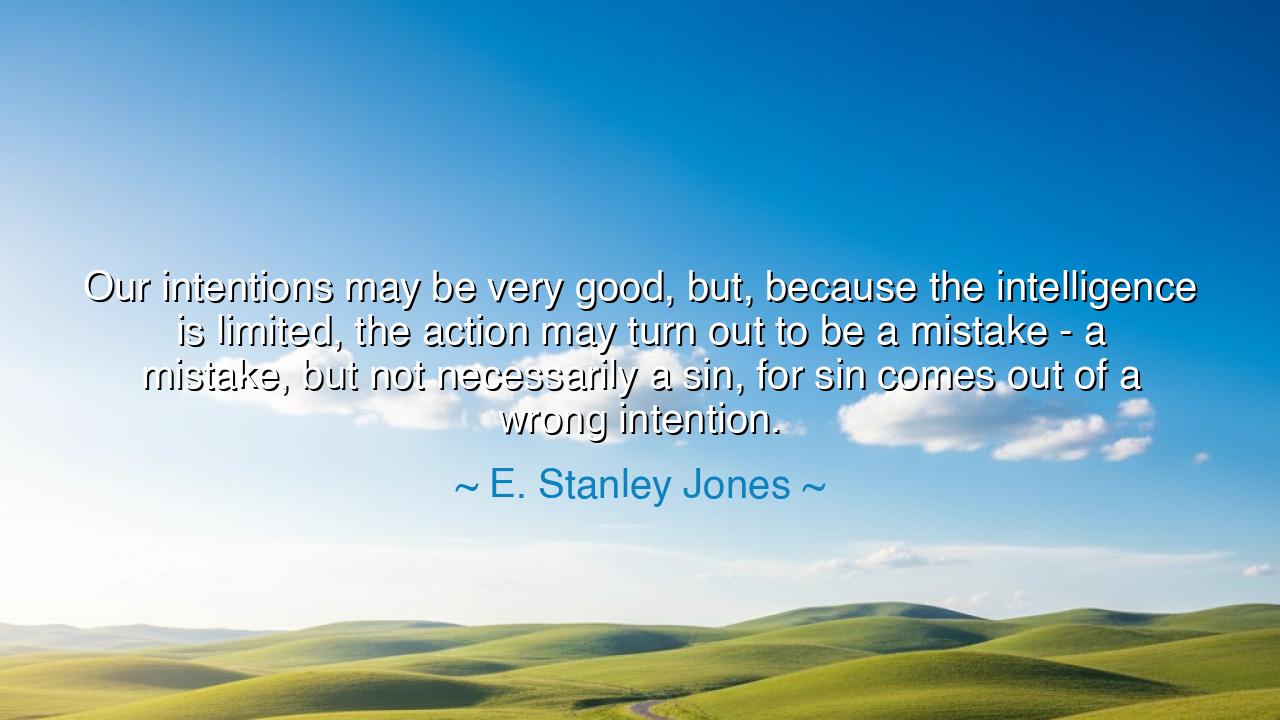
Our intentions may be very good, but, because the intelligence is
Our intentions may be very good, but, because the intelligence is limited, the action may turn out to be a mistake - a mistake, but not necessarily a sin, for sin comes out of a wrong intention.






The words of E. Stanley Jones, a missionary, thinker, and mystic of the twentieth century, flow with the quiet strength of one who has studied both the light and frailty of the human heart: “Our intentions may be very good, but, because the intelligence is limited, the action may turn out to be a mistake — a mistake, but not necessarily a sin, for sin comes out of a wrong intention.” In this statement, Jones draws a line as ancient as morality itself — the sacred boundary between error and evil, between the ignorance of the mind and the corruption of the will. His words are a lantern to those who struggle with guilt, doubt, and judgment, for they remind us that to err is human, but to intend rightly is divine.
The origin of this wisdom lies in Jones’s deep study of both Christianity and the human spirit. As a missionary who spent much of his life in India, he saw men of many faiths striving toward goodness in different ways. He learned that virtue is not measured only by correctness of action, but by purity of intention. He saw that many who acted wrongly did so not out of malice, but out of limited understanding — their minds clouded, yet their hearts sincere. This realization shaped his theology: that sin is not every failure or blunder, but the deliberate turning away from truth and love. Mistakes, however painful, are the inevitable consequence of our finite minds; sin arises when the heart, knowing what is right, chooses otherwise.
To say that “intelligence is limited” is to confess the great humility of our condition. No matter how wise we become, our perception is clouded by bias, fear, and ignorance. We may set out to heal and instead harm; we may act to protect and instead wound. History is full of such tragic paradoxes. Consider the tale of Oedipus, the ancient king who sought to avoid the prophecy of patricide and incest — only to fulfill it through the very steps he took to escape it. His intention was noble, his intelligence insufficient, and his action became catastrophe. Yet who can call Oedipus evil? His downfall was not born of sin, but of blindness — the blindness that is part of every mortal life.
Jones’s insight echoes this ancient understanding: that the divine judges the heart before the deed. A man may stumble in the dark and break what he sought to mend, yet if his motive was love, compassion, or truth, his fall is not damnation but lesson. Indeed, it is through mistakes that wisdom ripens. The sinner and the fool may both fail, but their inner worlds are as different as night and dawn. The sinner rejects truth knowingly; the fool simply cannot see it yet. The sinner must repent of his intention, while the fool must refine his understanding. Thus, where sin demands forgiveness, error demands learning.
Consider the story of Galileo Galilei, who, guided by a sincere desire for truth, defied the doctrines of his age. The Church condemned him, believing him sinful for questioning sacred order. Yet in time, the world saw that Galileo’s intention had been pure — not to destroy faith, but to illuminate creation. His intelligence, though limited by the science of his day, was guided by a moral clarity that transcended his era. What seemed rebellion was in truth revelation. In this, we see Jones’s teaching alive: that even when understanding falters, good intentions plant the seeds of progress. The hand may err, but the heart, if aligned with truth, can redeem the deed.
The lesson we draw from Jones’s wisdom is both comforting and demanding: judge not by outcome alone, but by intention. We must learn to see ourselves and others through the eyes of compassion. When we act in good faith and fail, let us not drown in guilt, but rise wiser, humbler, and more patient. When we witness others err, let us remember that most hearts are not wicked, but blind. In the divine economy, it is not perfection that is asked of us, but sincerity — the honest striving toward the good, even when our minds cannot fully grasp it.
Therefore, O seeker of truth, take this teaching as your guide: strive to purify your intentions, even as you refine your intelligence. When you act, ask not, “Will I be right?” but, “Am I seeking truth, love, and justice in this moment?” For pure intentions are like stars — even when clouds of error hide them, their light endures. Mistakes will come, as storms must come, but sin can be kept at bay if the heart remains anchored in goodness. Let this be your path: to act with courage, to think with humility, and to love with clarity. For though the mind is limited, the heart — when guided by right intention — touches the infinite.






AAdministratorAdministrator
Welcome, honored guests. Please leave a comment, we will respond soon